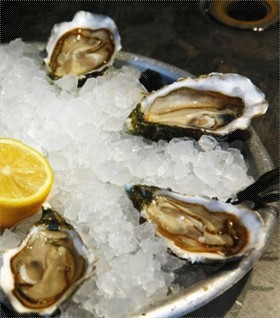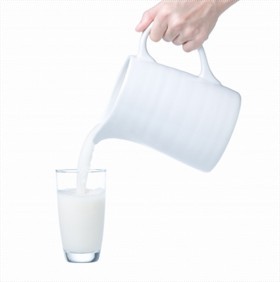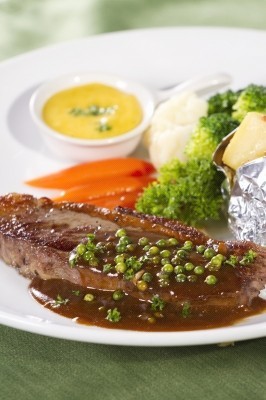
1. Oysters
Zinc is one of the main minerals critical to breastfeeding. For the best source of this mineral, indulge in oysters – they contain one of the highest amounts of zinc, ten times more than red meat.
Zinc also helps boost the immune system and aids in wound healing and tissue growth and repair, something you new mothers could use after going through that physically demanding delivery!
Photo courtesy of Tina Phillips
Zinc is one of the main minerals critical to breastfeeding. For the best source of this mineral, indulge in oysters – they contain one of the highest amounts of zinc, ten times more than red meat.
Zinc also helps boost the immune system and aids in wound healing and tissue growth and repair, something you new mothers could use after going through that physically demanding delivery!

2. Dairy products
Cheese, yoghurt, milk – these foods contain calcium, another mineral that’s good for your baby when breastfeeding. Calcium helps build strong bones and teeth, just to name a few health benefits.
If your baby doesn’t get enough calcium from the milk, it will draw it from the mother’s bones, affecting your health in the long run. Three cups of dairy on a daily basis should do the trick. Don’t overdo it though, excessive amounts of calcium can lead to constipation and prevent your body from fully absorbing essential minerals such as iron and zinc from foods.
Photo courtesy of John Kasawa
Cheese, yoghurt, milk – these foods contain calcium, another mineral that’s good for your baby when breastfeeding. Calcium helps build strong bones and teeth, just to name a few health benefits.
If your baby doesn’t get enough calcium from the milk, it will draw it from the mother’s bones, affecting your health in the long run. Three cups of dairy on a daily basis should do the trick. Don’t overdo it though, excessive amounts of calcium can lead to constipation and prevent your body from fully absorbing essential minerals such as iron and zinc from foods.

3. Cereal
Constipation is a common post-partum issue new mothers face. Deal with this problem by loading up on foods full of fibre, such as high-fibre cereal. Fibre helps regulate bowel movements and relief the pain from constipation as it boosts water content in the bowels, which in turn creates softer stools.
Also, when you increase your intake of fibre, remember to increase your fluid intake as well, so drink lots of water and avoid caffeine, alcohol, and drinks high in sugar!
Photo courtesy of ponsulak
Constipation is a common post-partum issue new mothers face. Deal with this problem by loading up on foods full of fibre, such as high-fibre cereal. Fibre helps regulate bowel movements and relief the pain from constipation as it boosts water content in the bowels, which in turn creates softer stools.
Also, when you increase your intake of fibre, remember to increase your fluid intake as well, so drink lots of water and avoid caffeine, alcohol, and drinks high in sugar!

4. Baked potatoes
Vitamin C is good for everyone in so many ways, especially for new mothers who have given birth via C-Section (Caesarean section). For a great source of Vitamin C, help yourself to some yummy baked potatoes with a little bit of butter. Vitamin C promotes speedy recovery of the surgical wound from the C-Section operation.
Photo courtesy of Wikimedia Commons
Vitamin C is good for everyone in so many ways, especially for new mothers who have given birth via C-Section (Caesarean section). For a great source of Vitamin C, help yourself to some yummy baked potatoes with a little bit of butter. Vitamin C promotes speedy recovery of the surgical wound from the C-Section operation.

5. Lean red meats
If you’re anemic, or if you learn that you are anemic after giving birth, you need to restore your iron reserves. This means eating more iron-rich foods such as lean red meats. Iron also helps boost energy levels; without this mineral you’ll feel drained and fatigued.
Photo courtesy of akeeris
If you’re anemic, or if you learn that you are anemic after giving birth, you need to restore your iron reserves. This means eating more iron-rich foods such as lean red meats. Iron also helps boost energy levels; without this mineral you’ll feel drained and fatigued.

6. Salmon
Salmon's such a great food because of its high levels of omega-3 oils, which help to boost brain function and is known to be a ‘mood enhancer’. Research shows that populations which consume large amounts of fish like salmon reflect lower overall rates of depression and postpartum depression among new mothers.
Photo courtesy of lobster20
See also:
Use the explore option to find the foods that satisfy your cravings
Find the best restaurants in Singapore
Salmon's such a great food because of its high levels of omega-3 oils, which help to boost brain function and is known to be a ‘mood enhancer’. Research shows that populations which consume large amounts of fish like salmon reflect lower overall rates of depression and postpartum depression among new mothers.